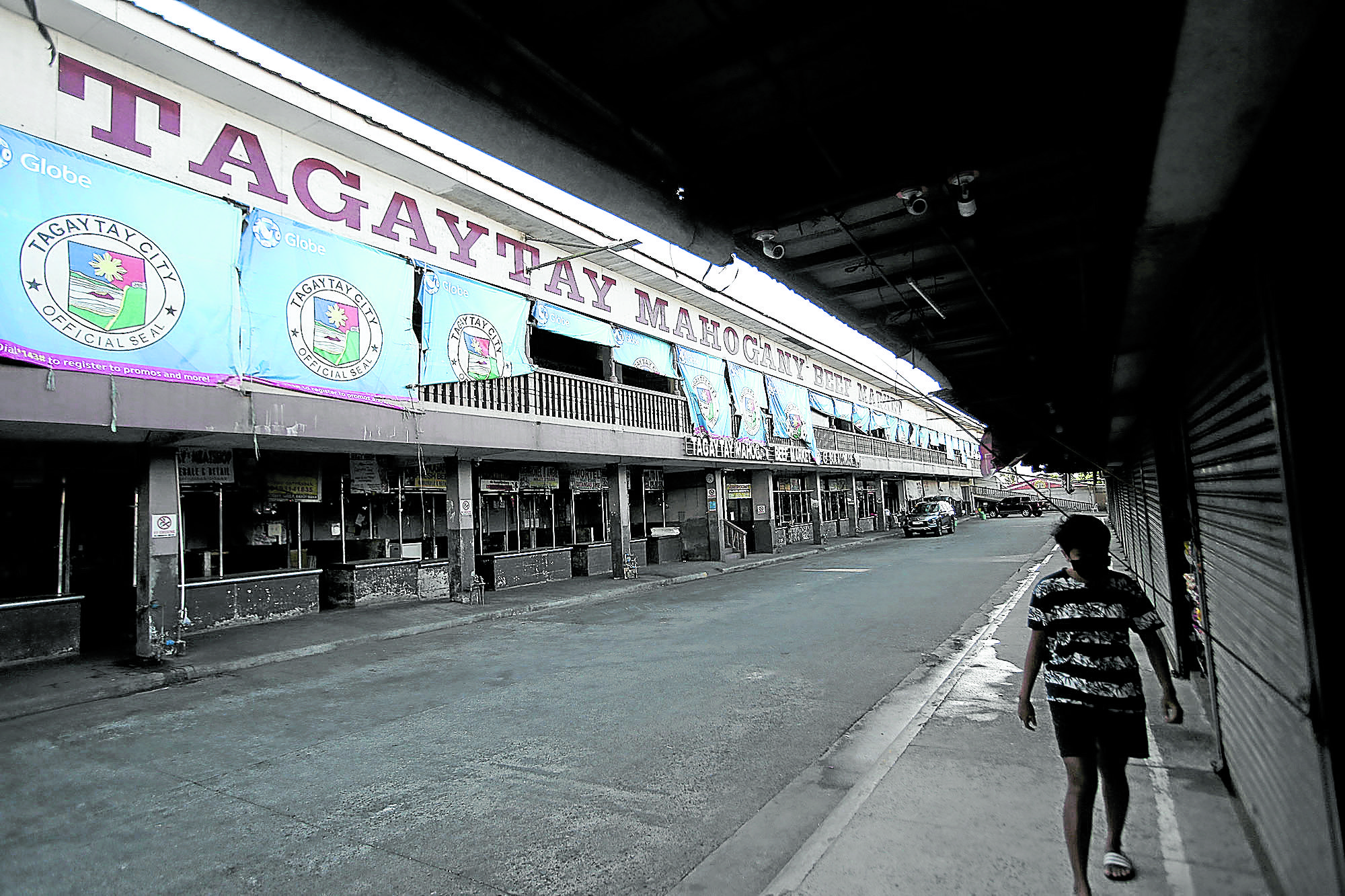
The Mahogany beef market is closed during the enhanced community quarantine in Tagaytay City, Cavite province imposed to contain the coronavirus disease 2019. (Richard A. Reyes/Inquirer)
MANILA, Philippines — There will still be no “chismis pass” and “pasyal pass” even if Cavite relaxes some rules once the province is placed under general community quarantine (GCQ) starting May 16, Governor Jonvic Remulla said Wednesday.
Remulla said the GCQ does not mean lives would be back to normal, stressing that safety measures should still be in place to protect residents from the coronavirus disease (COVID-19).
“Magkakaroon ng rebisyon ng Q-pass (quarantine pass) sa bawat bayan. Iba po ang Q-pass sa valid workers ID na valid for travel to work. Ang tanggapan ng alkalde ang magbibigay nito. Sila ang magbibigay ng sistema kung paano ang issuance,” he said in a Facebook post.
(There will be a revision on the use of quarantine passes in every town. A Q-pass is different from the valid workers ID which is valid for travel to work. The office of the mayor will be the one to provide this. It will be the ones to identify the system on its issuance.)
“Wala pa rin chismis pass. Kung walang Q-pass ay bawal pa rin ang tambay sa lansangan (There is still no “chismis pass.” If you don’t have a Q-pass, you are still not allowed to loiter in the streets),” he said.
If the holder of the quarantine pass goes to work, another member of the household may be given another quarantine pass, according to Remulla.
Those applying for jobs may also ask for a one-week renewable transit pass from the municipal government.
“Ang senior citizen na siyang natitirang pwedeng lumabas ay pwede rin kumuha ng special Q-pass mula sa munisipyo. Babala, isa pa rin kada bahay ang pwede (A senior citizen who is the only one in the household who can go out can also avail of a special quarantine pass),” added the governor.
Public transportation
Public transportation will resume operations in the province once the GCQ takes effect.
Public utility jeepneys, public utility buses, multi-cabs, and mini buses will be allowed to operate with 50 percent capacity. Tricycles are allowed to carry only one passenger.
“Ang pasada nito ay subject sa agreement ng mayor at ng mga samahan ng mga driver/operator (These operations are subject to the agreement between the mayors and the associations of drivers and operators),” explained Remulla.
He noted that the Inter-agency Task Force on Emerging Infectious Diseases (IATF-EID) has yet to release details on the “couple pass” for motorcycles.
Travel within the province will also be allowed under the GCQ.
“Halimbawa, ang taga-Bacoor na kailangan pumunta sa Mendez ay pwede na. Subject Ito sa one day transit pass mula sa Mayor. Hinde po ito pasyal pass. One day lang ang validity at para sa Q-pass holder lamang ang pwede mag apply. Ang work ID (halimbawa taga Magallanes na nagtratrabaho sa Yazaki sa Imus) ay pwedeng transit pass. No need to get another pass,” he explained.
(For example, residents of Bacoor who want to go to Mendez will be allowed to travel. This travel is subject to a one-day transit pass from the mayor. This is not a “leisure travel pass.” It only has one-day validity and is only quarantine pass holders can apply. Work ID (for example, those working in Magallanes who work in Yazaki in Imus) may also be used as a transit pass. No need to get another pass.)
Liquor ban, reopening of salons
Under GCQ, salons will be allowed to reopen based on the rules set by the IATF.
Remulla said those aged 20 years old and below who want to go to salons will be subject to a special transit pass from barangays.
“Kailangan kasama ang Q-pass holder. Hinde po Ito ‘pasyal pass’ para sa pamilya. Isang bata lamang at may oras na nakatakda para dito (They should be accompanied by Q-pass holders. This is not a “leisure travel pass” for the family. Only one child is allowed to have it and there is a time allotted for this),” he added.
On liquor, Remulla said the ban would remain in effect in Cavite until the provincial council passes a resolution allowing the consumption of alcoholic beverages.
Curfew hours will still be observed from 8 p.m. to 5 a.m. except for those with work permits, he said.
RELATED STORIES
NCR, Laguna, Cebu City placed under modified ECQ until May 31
In Cavite, curfew to stay even after lifting of ECQ – Remulla